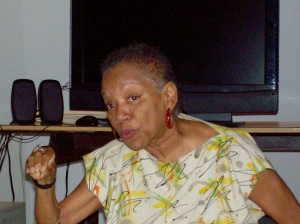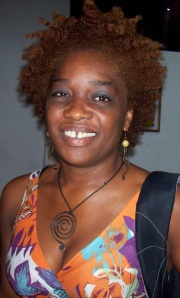Afro-Cuban Women Debating Cuba Today
June 13, 2011 § 12 Comments
I can remember the Cuban Missile Crisis in 1962. I was in elementary school, where we learned social studies within a Cold War framework. I remember the drills and exercises of getting under our desks to protect us from the nuclear bombs that were purportedly aimed at U.S. sites, military and civilian. Our lives were under threat, and the panic over national security permeated our everyday lives, especially in schools. I started my formal education at St. Joseph’s
Catholic School where the demonization of Castro’s Revolution offered a timely
“teaching moment” for applying lessons from the catechism to world
geography. Fidel Castro was evil as was the atheistic communism his revolution imposed on Cuban society, which had been officially Catholic before communism.
Somehow I didn’t internalize that indoctrination, and my evolving curiosity about Cuba and what used to be the Soviet Union led me to read about those places on my own, well beyond the textbook depictions–and distortions– of them. The bearded revolutionary leader, his Argentine comrade Ernesto “Che” Guevara, and Cuban society with, as I was to find out, its sizable presence of African descended people intrigued me. I still remember how engrossed I felt when I read about Cuba and the controversies associated with the rebel island in magazines and the library books I borrowed during Saturday afternoon excursions to the public library. Almost every weekend I would check out a stack of books on foreign countries. Cuba, Brazil, and South Africa were high on the list of places I wanted to know more about and, eventually, visit so I could see for myself what they were really like. Based on what I read, I admired Fidel’s utopian ideals and suspected that implementing them was a complicated, contradictory, and polarizing process. Over time, through more leisurely reading and, eventually, academic pursuits, I was able to add new layers and dimensions to my perspectives. My earlier romanticizations gave way to more demystified and critical views. My more nuanced perspective on Cuba’s complexities has also been influenced by opportunities to travel to the island.
My most recent trip was just last month (May 2011). I was part of an exciting research dialogue on “Afro-Cuban Women Today” that Casa de las Américas (a government institution that promotes the work of writers, artists, and humanities scholars throughout the Caribbean and Latin America) hosted in conjunction with Common Ground, a U.S.-based education and travel service working with Afro-Cuban writer Pedro Pérez Sarduy. Sarduy is the author of the award-winning The Maids of Havana (a novel informed by his own mother’s life)
and co-editor, with his wife historian Jean Stubbs, of Afro-Cuba and Afro-Cuban Voices. When I found out about the trip being planned around themes Pedro addresses in his writings, I was eager to become a part of the group. The plan was for us to have a series of intensive dialogues with Afro-Cuban writers, artists, social researchers, and workers in various settings in Havana and Santa Clara, the Sarduy family’s home town. Seeing today’s Cuba through the lens of Black
women’s lived experiences, social thought and cultural/aesthetic production was
a once-in-a-life opportunity for most of us. Moreover, the trip allowed me to follow up on issues I’d explored in my previous visit and in research I’d done in Jamaica, where I investigated the everyday effects of neoliberal globalization. During the 1990s I interviewed Afro-Cuban contract workers during the height of the “Special Period,” when they and their country were struggling to survive without the aid and markets of the former Soviet bloc. The intensification of the U.S. embargo exacerbated their predicament. They were working in Jamaica, through the mediation of a Venezuelan company, to help their households and families survive the crisis.
To adapt to the new conditions, the Cuban government implemented policies consistent with the logic of neoliberalism. Some measures of privatization and foreign investment were pursued with a big emphasis on developing tourism in its various forms, including heritage tourism with an emphasis on Afro-Cuban music and religion.
The uneven effects of this strategy made life extremely hard for the masses of Cubans, especially Afro-Cubans, who are less likely to have access to remittances from émigré relatives or from formal means of employment and entrepreneurship in the tourist sector. Afro-Cuban women, who are disproportionately single household heads, have borne the brunt of responsibility for meeting the
subsistence requirements of their families and communities. For many Cubans today, the economic austerity of the 1990s Special Period persists. Those routinized conditions, along with the racial and racialized gendered disparities and discrimination exhibited during these critical times, have deepened many people’s dissatisfaction with the quality of life in Cuba. However, much of the dissatisfaction and social criticism does not coincide with the anti-socialist stance of Cuban émigré and government critics in the U.S. One of the most interesting things I learned from the dialogues is that a public sphere is being forged for debate on issues about which constructively critical intellectuals and artists—and the larger communities to which they belong—care a great deal.
The Common Ground group met with a dynamic group of scholars, artists, and
workers. Most of the latter had employment histories that pre-dated the
revolution. They were associates and the surviving sister of Marta, the woman who inspired Sarduy’s The Maids of Havana. They worked in affluent white Cuban homes in neighborhoods like Vedado and Miramar. This older generation of women we met emphasized the major changes for the better that the revolution had brought into their lives. The revolution gave them opportunities
to work in other occupations with better pay and work conditions. Because of the revolution, their children had access to healthcare, education and employment mobility to an extent inconceivable before the revolution. Although beneficiaries of Cuba’s socialism, the second generation, who came of age after the revolution, spoke of how racism hadn’t been eliminated and still persists. This generation as well as today’s youth and young adults express greater frustration and disappointment over their society’s constraints, over not being able to realize their dreams. In an interview writer Yusimí Rodríguez published in HavanaTimes.org last month, Omar, a university-educated man who makes his living as a street vendor selling books, states: “This country kills your dreams … they squeeze you and in the end you don’t have anything.” He makes much more money on the streets than from the teaching and coaching he did for “more than twenty years.” He goes on to explain that the positive things about Cuban society, “free education, free health care and all those things everybody knows about… aren’t everything in life” (“Omar, a Cuban Athlete, Trainer, and Bookseller”). In other words, the meaning of the good life goes beyond the universal benefits, especially when they’ve been used to rationalize the repression of political dissent and independent sociocultural expression.
Some of the amazing women we met and learned so much from were the
internationally acclaimed poet and literary scholar Nancy Morejón (“Mujer Negra”), filmmaker Gloria Rolando (“Roots of My Heart”), historian, Daisy Rubiera (Reyita, her mother’s testimonio), the narrative writer, theater critic, and cultural historian Inés María “Lalita” Martiatu (Over the Waves and Other Stories), blogger Sandra Álvarez (http://negracubanateniaqueser.wordpress.com),
and the feminist hip hop artist, Magia MC (Magia López),
of the husband-wife rap duo, Obsesión. Although I found all of these women to
be as inspiring as they were informative, I was especially intrigued by the
younger women who make their voices public and exercise civic leadership by
contributing to the overlapping and transnationally-situated spheres of popular
culture and cyberspace. For instance, the music videos (“Se Busca,” “Los Pelos” and “Esta es mi Mamá”) that Obsesión produces on their home PC are available on YouTube, making their art accessible internationally as well as to their immediate Cuban audience, which enjoys and participates in live performances. In the case of Álvarez’s blog, she and her contributors raise issues of racism, sexism, and homophobia that are not adequately addressed in mainstream media.
Because Martiatu, a mentor to many young writers and bloggers, had encouraged
her to attend, Yusimí Rodríguez López, an aspiring fiction writer and a contributor to the two-year old online news publication, HavanaTimes.org (published in both Spanish and English), attended the Casa de las Américas dialogues. I so enjoyed my conversation with her that, upon my return home, I’ve read several of her articles and interviews on freedom of the press, street musicians, transvestites, and other aspects of everyday life and “spiritual rhythm” in Havana. (She is quoted to have used this latter phrase in characterizing Cuba to U.S. writer Paul Nelson; http://www.globalvoicesradio.org/cuba/pages/17_jpg.html .) She also wrote a provocative commentary on “nappy” hair, “Lidiando con mi ‘pasa’”/Dealing with my nappy hair) for Sandra’s blog that’s been posted on another site as well. (Ethnolust posted a reflection on it a few days ago.)
Although she writes for online periodicals and blogs, in a recent email message to me she claimed that she rarely sees her writings online. She is too busy, and when she has access to a computer, the Internet connection is extremely poor. Nonetheless, she fares much better than the average Cuban, who has little to no access to email or the web. This is a paradox that Cuban bloggers and online journalists face. Consequently, the online sphere of debate and cultural critique that’s been expanded to include such interlocutors as Sandra, Yusimí and their mentor Lalita Matiatu (http://afrocubana.wordpress.com/ ) does not, like radio and television, reach a mass Cuban audience. Yet the limited access that does exist to these online sites of discursive and cultural struggle aren’t blocked or censored as are sites deemed to be “counterrevolutionary.” This suggests that these relatively new cyberspatial projects are the outcome of an ongoing negotiation between the counter-publics of civil society and the state, which struggles to sustain its legitimacy in a context of growing social disparities and ideological contestation. The international accessibility of these blogs and other e-publications facilitates an exchange of ideas beneficial to all concerned, ensuring that the embargo does not prevent the flow of ideas and intercultural communications. I welcome these and other means of familiarizing myself with how Afro-Cuban women influence the terms of debate at home and abroad on Cuban society today and its potential tomorrow.
Contributed by Faye V. Harrison








Thank you Faye, for this interesting post on your most recent visit to Cuba, to connect with these dynamic black Cuban women. This is such an exciting moment of change and opportunity and connection, and at the same time one of such difficulty– and most of all, complexity. I am very happy to see this conversation taking place on ETHNOLUST– a bit selfishly because my new book, ¡Venceremos?: The Erotics of Black Self-making in Cuba, engages in these issues as well, and I am anxious for more conversation on contemporary black Cuba. The book comes out in August, and I look forward to your comments on it! in the meantime 🙂 here’s a short piece I did for Latin American Perspectives on Black Cuba and Black US http://jafariallen.com/2011/05/29/looking-black-at-revolutionary-cuba/
Thanks, Jafari, for taking the time to read this post, based on a glimpse of Afro-Cuban women’s lives based on conversations and readings.. Your book has been anticipated for some time, so I look forward to reading it. Thanks for the link to your article, and I am glad that you mention the pending pubication of your book here.
Thank you, Faye! Thank you for sharing your experiences and enlightening me about Ethnolust. I’m a subscriber!
There’s so much to learn in terms of this subject. To be quite honest, when pondering women in Cuba, my mind always delivers me to Assata Shakur.
Yet, her story is not their story. Afro-Cuban women have a host of historical and contemporary jewels to heap upon us. All we need do is listen.
Barbie
Jones, My Opinion
Barbie,
Thanks for your comments! And for mentioning/remembering Assata Shakur, who has a relationship with some of the Afro-Cuban women I’ve mentioned, particularly Gloria Rolando. Rolando has documented Shakur’s exile and the intersections between African American and Afro-Cuban struggles in “Eyes of the Rainbow,” a powerful film that I saw for the first time some eleven years ago. It’s so important that more of us know about independent film like these.
Warm wishes,
Faye
I’ve been warming up recently to academic discourse on social conditions and challenges for Afro peoples but there is still a lingering feeling or sense of futility about the power or role of such discourse in ultimately leading to a betterment of the condition of the Afro person in Cuba and elsewhere in the world. Here again, is an article that stimulates thought which for me is a sharp and direct focus on the “what next?” of racism rather than on how fast Castro and his ilk can keep up with the neoliberal march. The consciousness sustained by the work of these artists shine important light on the flusterings from below that I hope will meet the political someday, somehow. Cuba in the news recently seems to lean toward breaking out of the old mold, at least partially. I can only hope that this means more freedom of expression, and increasingly, a rapprochement of artistic courage and social change. Thank you, “High Priestess” and “Custodian” for teaching from the high seas.
Thanks for your comments, which raise an important point about the need for change and the limits of academic reportage. But in this case especially, the blockade has made it difficult for most of us to know what the experience of ordinary Cuban, especially Afro-Cubans are as they themselves would characterize it beyond the party line. I feel that some of what I was told by these women and especially in their writings gets at that kind of honest perspective that’s critical yet aware that the answer to their societal contradictions are not those being proposed on this side of the 90 mile distance from Florida. Whether, when and how these articulate women’s interrogations and critiques are transformed into political formation is a question for us to asnwer through our witnessing and solidarity. At this stage, I thought that just writing this piece and others in the future might be a step in that direction. Some of my travel companions and I are also putting our heads together to find other, more concrete ways of putting solidarity into reasonable action–in admiration and deference to our Cuban collegues, who are agents in their own historical crucible. There is a lot that we can do as citizens here–for example: educating the public (including our students who are part of the “real world” as they study in post-secondary institutions, most of which are subject to the logic that anthropologists and other social scientists study in various sites “over there/”). African Americans and other African peoples have a long history as critics lobbying US foreign policy. This is what TransAfrican Forum does specifically from a Black perspective, but there are other organizations as well. An integral part of the “homework” we intellectuals must do is to apply our research skills to ourselves and our own society to find out what the social and political organization of civil society is in its negotiations with state apparatuses, processes and effects. Perhaps then we can make informed choices about how best to position ourselves to work for change in strategicaly concerted ways. There’s so much civic work that needs to be done. It’s important to begin somewhere. In view of your background as a mover and shaker, I look forward to continuing this conversation.
Faye your details of our trip to Havana are filled with acute accuracy and jolted me back to the wonderful memories from the trip. The River Negro huge, wide and strong surrounded by hills and lush that I had no idea I would experience. My mind was filled with so many other narratives of Cuba. Our conversations both from the Cuban Afro sisters and ourselves keep popping up and remind me of my inability to speak the words in Spanish. I have begun a pen-pal relationship with Yusimi
who is kind beyond her years and writes with sensitivity and boldness.
Thank you Faye
Rosie,
Thanks so much for reading the blog and offering your reply. I was motivated to write this entry because I was so intensely inspired by the power of the physical and social landscape and, most importantly, the relationships we all have begun to cultivate with our Afro-Cuban sisters. I, too, have been e-corresponding with Yusimi, Sandra, and Irene and have continued to learn from them and from the literature I’ve come across since my return. I’m on board for the language training program you are planning with the help of Kim Butler, so keep me informed, por favor!
Thank you, Rosie!
[…] is an interview by Yusimi Rodriguez, a young woman Cuban writer and blogger, with Cuban artist Yasser […]
[…] the Afro-Cuban artists, Rosie and the group were delighted to meet Yusimí Rodríguez López, an aspiring fiction writer and contributor to the two-year old online news […]
[…] Women Debating Cuba Today,” posted on Ethnolust in June. If interested, you can find it at http://ethnolust.com/2011/06/13/afro-cuban-women-debating-cuba-today/ and also on the Afrocubanas blog at […]
[…] the Afro-Cuban artists, Rosie and the group were delighted to meet Yusimí Rodríguez López, an aspiring fiction writer and contributor to the two-year old online news […]